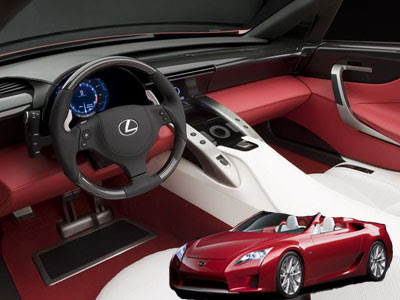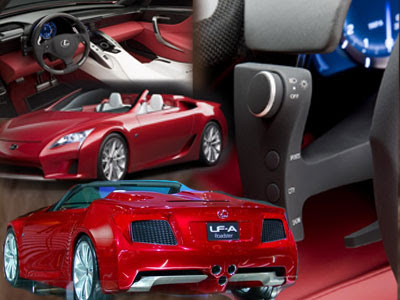
LEXUS LF-A Roadster
The LF-A Roadster’s LEXUS V10 engine supercar Concept.
Lexus will stage the Australian debut of its own supercar, the LF-A Roadster, at the Melbourne International Motor Show on 27 February.The LF-A Roadster goes on display in Melbourne after headlining motor shows in Tokyo and Detroit.
The Roadster’s V10 engine is capable of producing more than 360 kilowatts and test-track speeds greater than 330km/h.
Its sleek design utilises a lightweight carbon-fibre and aluminium body that ensures structural rigidity is maintained, even without a roof.
Styling of the LF-A Roadster draws extensively from the Lexus L-Finesse design philosophy and has been designed to deliver maximum aerodynamic efficiency.
The rear of the Roadster is marked by a pair of wrap-around, arrowhead-shaped taillights and a trio of centrally positioned exhausts.
To attain the best possible weight distribution, Lexus engineers positioned the radiators at the rear of the vehicle, which also allows for a sleeker front-end design.
The two rear-mounted radiators are fed cool air by two large intake ducts located forward of the rear wheel wells, and heated air is vented out behind the vehicle via a pair of large grilles.
The engine is mounted in a “front-mid” configuration – in front of the passenger compartment, but behind the front-axle centreline.
The engine is connected via a torque tube and propeller shaft to a transaxle that is controlled by paddle shifters. The torque tube is a structural member that adds rigidity to the drive train and chassis, while also reducing vibration.
The LF-A Roadster features wide high-performance tyres on turbine-styled alloy wheels.
The Melbourne International Motor Show is on at the Melbourne Convention and Exhibition Centre from 27 February to 9 March.
Its sleek design utilises a lightweight carbon-fibre and aluminium body that ensures structural rigidity is maintained, even without a roof.

LEXUS LF-A Roadster
Styling of the LF-A Roadster draws extensively from the Lexus L-Finesse design philosophy and has been designed to deliver maximum aerodynamic efficiency.
The rear of the Roadster is marked by a pair of wrap-around, arrowhead-shaped taillights and a trio of centrally positioned exhausts.
To attain the best possible weight distribution, Lexus engineers positioned the radiators at the rear of the vehicle, which also allows for a sleeker front-end design.
The two rear-mounted radiators are fed cool air by two large intake ducts located forward of the rear wheel wells, and heated air is vented out behind the vehicle via a pair of large grilles.
The engine is mounted in a “front-mid” configuration – in front of the passenger compartment, but behind the front-axle centreline.

LEXUS LF-A Roadster
The engine is connected via a torque tube and propeller shaft to a transaxle that is controlled by paddle shifters. The torque tube is a structural member that adds rigidity to the drive train and chassis, while also reducing vibration.
The LF-A Roadster features wide high-performance tyres on turbine-styled alloy wheels.
The Melbourne International Motor Show is on at the Melbourne Convention and Exhibition Centre from 27 February to 9 March.













0 komentar:
Post a Comment